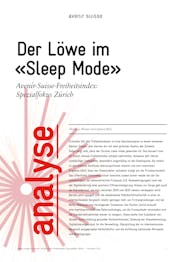Since 2013, Avenir Suisse’s Freedom Index has compared the state of freedoms in the cantons on the basis of 30 different civil and economic indicators. For the first time, this year’s Freedom Index includes a focused analysis on a single canton: in this case, Switzerland’s largest, Zurich.
The analysis shows that the “lion” (drawing on the canton’s symbol) has become tired. After a slow but steady decline in numerous indicators over recent years, Zurich now finds itself ranked a lowly 16th.
The decline stems mainly from increasing rules and bureaucratic hurdles, amid growing inefficiencies in the public sector and cantonal and municipal administrations. The authors draw particular attention to the rising number of social restrictions imposed at cantonal level, such as no-smoking rules that go well beyond Swiss federal requirements.
Particularly striking is the public spending ratio, which is increasing disproportionately compared with the other cantons, leading to an unfortunate situation in Zurich where the public sector is growing more rapidly than the private sector. The total public sector payroll in the canton now exceeds 100,000. Moreover, the growth in public sector employment has not as yet led to obvious increases in efficiency, either in terms of the speed of administrative processes (e.g. building permits) or digitization. Such expansion has easily outstripped broader economic growth, the authors note.
Zurich’s debt burden, which will have almost doubled between 2020 and 2025, is another cause of concern. The canton’s declining attractiveness as a place to do business is already reflected in a relatively low number of company start-ups, compared with other cantons, as well as in a net outflow of wealthy residents.
The canton of Zurich needs a strategy of market-based reforms to reverse these regative trends and reboot its attractiveness. This strategy should rest on five pillars: safeguarding healthy cantonal finances, reducing the tax burden, accelerating the digitization of the administration, reviewing what is – by cantonal standards – a pronounced culture of prohibitions, and breaking up cantonal monopolies and interests.






